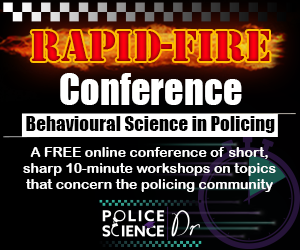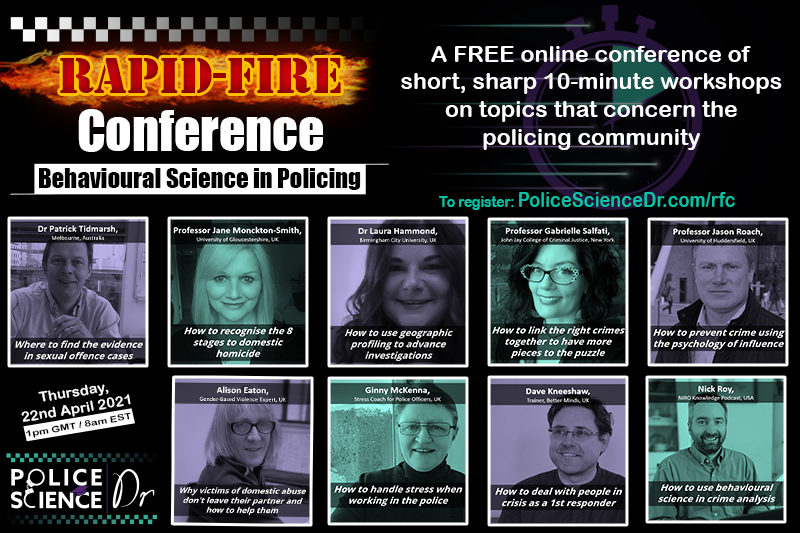 On Thursday, 22nd April 2021, at 1pm, anyone with an interest in law enforcement, criminology, behavioural science, policing, investigative psychology and all other related areas, is in for a treat.
On Thursday, 22nd April 2021, at 1pm, anyone with an interest in law enforcement, criminology, behavioural science, policing, investigative psychology and all other related areas, is in for a treat.
The Police Science Dr, is holding an online conference that provides short training sessions on behavioural science in policing.
Respecting people’s demands on time and the fact that attention spans can be rather short when listening to someone talk from a screen, the Rapid-Fire conference delivers short bursts of learning provided by a range of world-class experts, spanning from New York to Australia. Here’s what’s on offer:
- Dr Patrick Tidmarsh, Melbourne University, Australia
· Where to find the evidence in sexual offence cases - Dave Kneeshaw, of Betterminds, UK
· How to deal with people in crisis as a 1st responder - Professor Jane Monckton-Smith, University of Gloucestershire, UK
· How to recognise the 8 stages to domestic homicide - Nicholas Roy, NIRO Knowledge podcast, USA
· How to include behavioural science in crime analysis - Professor Jason Roach, University of Huddersfield, UK
· How to prevent crime using the psychology of influence - Dr Laura Hammond, Birmingham City University, UK
· How to use geographic profiling to advance investigations - Professor Gabrielle Salfati, John Jay College of Criminal Justice, USA
· How to link the right crimes together to have more pieces to the puzzle - Ginny McKenna, former PC, Stress Expert for Police
· How to handle stress when working in the police - Alison Eaton, former DCI turned gender-based violence expert
· Why victims of domestic abuse don’t leave their partner and how to help them
Register here to attend the free RAPID-FIRE Conference on Behavioural Science in Policing supported by Policing Insight: www.PoliceScienceDr.com/rfc
What is Police Science Dr?
Police Science Dr is an online space where academic findings and best practice in police work are made accessible to cops and police staff
Police Science Dr is an online space where academic findings and best practice in police work are made accessible to cops and police staff; they don’t usually have access to academic journals, and if they did, they wouldn’t have the time to read dry, lengthy articles that often debate theories and methodologies.
Research that is actually relevant to those in law enforcement, in a practical way, can be watched on the website in the form of videos, listened to in the form of a podcast, and read in the form of the videos’ transcripts. The transcripts can only be accessed by individuals who join the free email list, which gives them access to the website’s ‘Read’ page.
Another perk for subscribers is the weekly Police Science Snippets that are emailed out, which extract 3 golden nuggets of information from research articles, with the link to the original papers. These Snippets have been extremely popular, as the single criterion for their inclusion in the weekly mail-out is that the Snippet on its own provide something that somebody working for the police can act on, take into account for their own work, or start implementing right away.
They cover a range of topics, such as homicide investigations, geographic profiling, crime analysis, interviewing of suspects or witnesses, response policing, sex-offending, and many other areas relevant to law enforcement.
What’s next?
A number of the conference speakers are in the process of creating an online course for the Police Science Dr Academy, but the training sessions delivered at the event provide valuable learning in their own right. The Academy is being developed as an online platform that holds a variety of courses from established subject-matter experts on a range of topics within law enforcement and related fields.
Not long after the conference, the Police Science Dr Academy is launching its first feature-length course, helping cops and police staff through stress. One of the conference speakers, Ginny McKenna, is an ex-cop who was driven to the brink of suicide by the stress of the job, coupled with sexual discrimination, harassment and bullying.
Decades later, having left the police, she trained to become an accredited coach and now specialises in helping others who work in policing through those rough times. Her course ‘Emergency Stress Pit Stop – Helping Police Officers & Police Staff Beat Stress, Take back Control & Thrive’ is the first course available on the Academy.
Readers are invited to register for the free RAPID-FIRE Conference on Behavioural Science in Policing supported by Policing Insight: www.PoliceScienceDr.com/rfc, to watch anything in the video gallery: www.PoliceScienceDr.com/watch and to sign up to the free email list, to receive the weekly Police Science Snippets, be the first to know about new videos, events or courses that are relevant to all those in policing with an open mind to developing their skills and capacity, and police research. To join the email list, simply leave your details in the form on the website.



